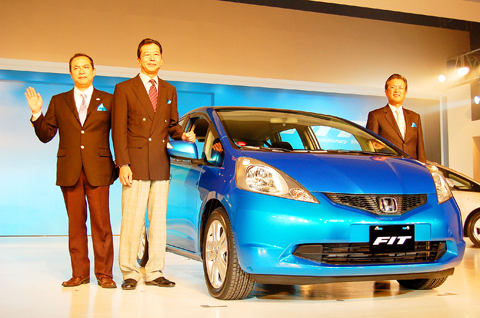Honda Taiwan Co (台灣本田) joined the local compact car market yesterday with the launch of its new Honda Fit as consumers increasingly turn to more economic auto models amid high oil prices.
The release of the 1,500cc Honda Fit in Taiwan, touted as a fuel-efficient, performance-based, spacious model, is aimed at attracting drivers from the 1,800cc passenger car segment that includes the Honda Civic, Mitsubishi Lancer and Toyota Corolla Altis.
Honda Taiwan manager Wey Gow-jhy (魏國志) said the domestic auto market had been fast declining since 2005 — when sales of new vehicles hit a high of 514,634 units — to an estimated 230,000 units this year.

PHOTO: KAO CHIA-HO, TAIPEI TIMES
“Despite the slump in the local market, sales of small cars have been steadily rising to account for an estimated 21 percent of the market this year and will likely continue to go up,” Wey said.
With the 30-to-34 age group as its target, the Honda Fit comes in two models — VTi-S and VTi — that are priced at NT$599,000 and NT$579,000 respectively. The company aims to sell 10,000 units of the new model in the first year.
China Motor Corp (中華汽車), a local vehicle manufacturer and distributor of Mitsubishi, said that low-priced, fuel-saving small cars now account for 20 percent to 21 percent of the market, up slightly from 16 percent to 17 percent last year.
“With the global financial crisis casting a shadow on future prospects, I expect small cars to become more popular in the next year or two as people try to live within their means,” Wang Kuo-chi (王國繼), vice president of China Motor, said on Tuesday while introducing the updated Mitsubishi Colt Plus, a supermini first launched in April last year.
Wang said monthly sales of the Colt Plus, the bestseller in the small, 1.6 liter engine market, averaged 500 to 550 units.
The company expects sales of the updated model, priced between NT$509,000 and NT$599,000, to reach 600 units a month.
Wang said he expected new cars sales in Taiwan to remain at last month’s level and continue through the end of the first quarter next year.
The latest government statistics showed that local new car sales plunged 22.6 percent last month from a year earlier to 16,737 units.
Honda Taiwan chairman Yoshiyuki Suzuki said he had expected local auto sales to pick up between the end of this year and the beginning of next year. However, as the US financial crisis continues to spread, he said auto sales could get even worse next year.
Separately, domestic gasoline and diesel prices will drop by NT$1.4 and NT$1.5 per liter respectively today to reflect the decline in international crude oil prices, the state-owned CPC Corp, Taiwan (CPC, 台灣中油) and Formosa Petrochemical Corp (台塑石化), the nation’s only publicly traded oil refiner, announced yesterday.
After the price adjustment, CPC’s price for a liter of 98-octane unleaded gasoline is NT$26, 95-octane unleaded gasoline is NT$24.50, 92-octane unleaded gasoline is NT$23.80 and diesel is NT$20.80.

LIMITED IMPACT: Investor confidence was likely sustained by its relatively small exposure to the Chinese market, as only less advanced chips are made in Nanjing Taiwan Semiconductor Manufacturing Co (TSMC, 台積電) saw its stock price close steady yesterday in a sign that the loss of the validated end user (VEU) status for its Nanjing, China, fab should have a mild impact on the world’s biggest contract chipmaker financially and technologically. Media reports about the waiver loss sent TSMC down 1.29 percent during the early trading session yesterday, but the stock soon regained strength and ended at NT$1,160, unchanged from Tuesday. Investors’ confidence in TSMC was likely built on its relatively small exposure to the Chinese market, as Chinese customers contributed about 9 percent to TSMC’s revenue last

With this year’s Semicon Taiwan trade show set to kick off on Wednesday, market attention has turned to the mass production of advanced packaging technologies and capacity expansion in Taiwan and the US. With traditional scaling reaching physical limits, heterogeneous integration and packaging technologies have emerged as key solutions. Surging demand for artificial intelligence (AI), high-performance computing (HPC) and high-bandwidth memory (HBM) chips has put technologies such as chip-on-wafer-on-substrate (CoWoS), integrated fan-out (InFO), system on integrated chips (SoIC), 3D IC and fan-out panel-level packaging (FOPLP) at the center of semiconductor innovation, making them a major focus at this year’s trade show, according

DEBUT: The trade show is to feature 17 national pavilions, a new high for the event, including from Canada, Costa Rica, Lithuania, Sweden and Vietnam for the first time The Semicon Taiwan trade show, which opens on Wednesday, is expected to see a new high in the number of exhibitors and visitors from around the world, said its organizer, SEMI, which has described the annual event as the “Olympics of the semiconductor industry.” SEMI, which represents companies in the electronics manufacturing and design supply chain, and touts the annual exhibition as the most influential semiconductor trade show in the world, said more than 1,200 enterprises from 56 countries are to showcase their innovations across more than 4,100 booths, and that the event could attract 100,000 visitors. This year’s event features 17

Hon Hai Precision Industry Co (鴻海精密), which assembles servers for Nvidia Corp, yesterday said that revenue last month rose 10.61 percent year-on-year, driven by strong growth in cloud and networking products amid continued front-loading orders for artificial intelligence (AI) server racks. Consolidated revenue expanded to NT$606.51 billion (US$19.81 billion) last month from NT$548.31 billion a year earlier, marking the highest ever in August, the company said in a statement. On a monthly basis, revenue was down 1.2 percent from NT$613.86 billion. Hon Hai, which is also a major iPhone assembler, added that its electronic components division saw significant revenue growth last month, boosted